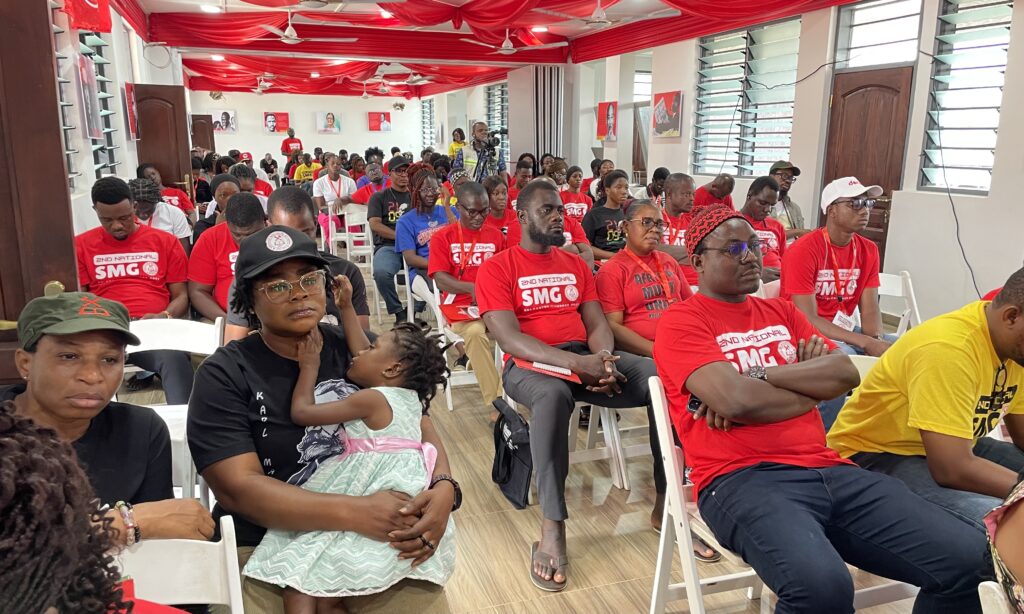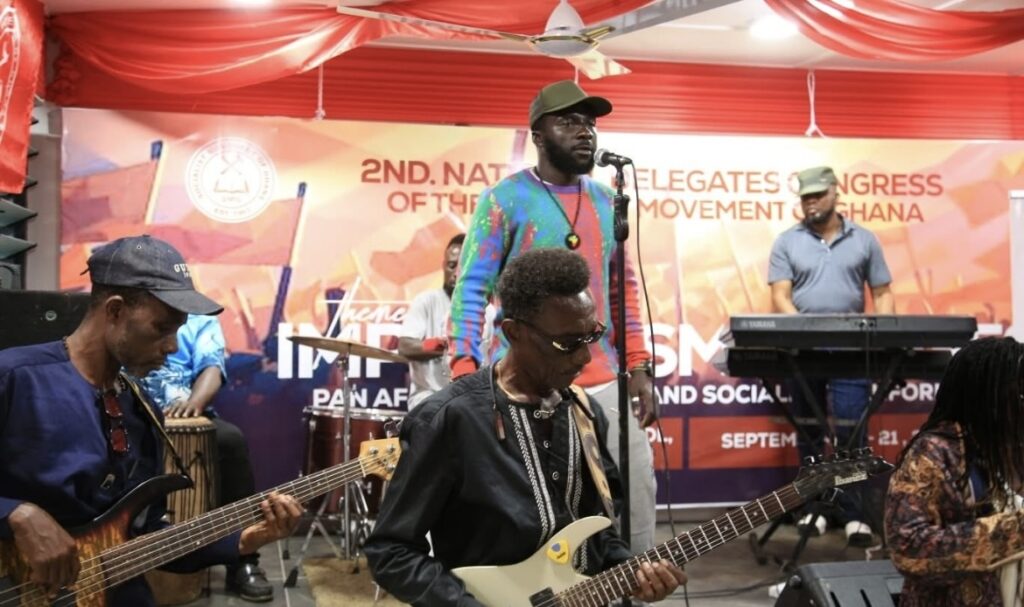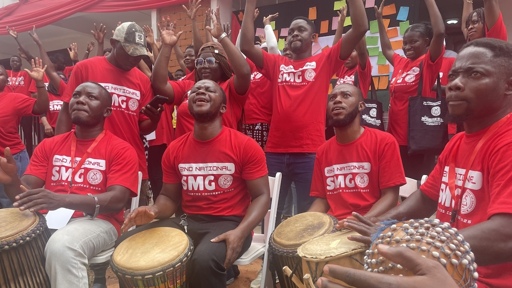Convened under the theme, “Imperialism in Crisis: Pan-African Solidarity and Socialist Transformation,” the Second National Delegates Congress of the Socialist Movement of Ghana (SMG) concluded on Sunday, September 21, at the Amílcar Cabral School in Agynoa, Aburi. Bringing together 300 delegates from across Ghana, the Congress discussed the national and international situation, reviewed the work of the movement’s youth and women’s wings, and strengthened the organization’s constitution.
The Congress recognized that global capitalism, particularly its neoliberal form, was in a profound crisis. Delegates argued that the “system’s reliance on exploiting labor, extracting resources, and concentrating wealth inevitably led to inequality, environmental destruction, international chaos and imperialist wars.” This was recognized as not being accidental but rather inherent to the system of capitalism and therefore “demands organized, conscious resistance.” The Congress noted that in response to growing resistance from the working class, particularly in the Global South, imperialist powers were increasingly using brute force to maintain their dominance.
Nationally, Congress resolutions saw the SMG reaffirm its commitment to the struggles of the Ghanaian working people against capitalist and neoliberal policies, arguing that these policies “deepen dependency, inequality, poverty, and environmental destruction.”
The Congress called for a halt to the commodification of public goods and the privatization of national assets. It demanded the “advancement of democratic participation for workers, women, and youth in all spheres of national life.”
The SMG also committed to intensifying political education and organization at the grassroots level of the movement as a foundation for socialist transformation in Ghana.
While not directly emerging from the Congress resolutions, a notable first worth highlighting is that the SMG tactically engaged with Ghana’s 2024 national elections by issuing a comprehensive manifesto, even though the movement itself did not contest. The platform championed crucial issues, including women’s rights, youth empowerment, and environmental protection. According to SMG General Secretary Kwesi Pratt Jnr., the document’s singular goal was “to create a platform for mass mobilization against the neoliberal order and to demonstrate that there is a viable alternative.” Furthermore, the movement achieved a concrete political victory. Two SMG members from the Ho and Sunyani collectives contested on the National Democratic Congress (NDC) ticket, and both won their parliamentary seats.
 Delegates attend the Second National Congress of the Socialist Movement of Ghana, 21 September. Photo: Pan Africanism Today
Delegates attend the Second National Congress of the Socialist Movement of Ghana, 21 September. Photo: Pan Africanism Today
Within Africa, the Congress resolutions condemned the plunder of the Democratic Republic of Congo’s vast resources by imperialist powers and their local collaborators.
The Congress saluted the struggles of the peoples of Mali, Burkina Faso, and Niger “who are confronting imperialist domination and asserting their right to sovereignty and self determination.” Importantly, the Congress emphasized its commitment to “strengthen Pan-African solidarity with the peoples of the Sahel in their struggle for dignity and independence, as they undertake an alternative route to development free from imperialist control.”
The SMG condemned Morocco’s continued illegal occupation of Western Sahara and called for “the full implementation of UN resolutions recognizing the right to self-determination of the Sahrawi people and their independence.”
With internationalism as a firmly committed principle of the organization, the SMG strongly condemned the ongoing Israeli apartheid regime’s genocide against the Palestinian people, backed by US imperialism and its allies, especially Western European states. The SMG demanded “an immediate end to the massacres in Gaza, the dismantling of the apartheid system, and the recognition of the Palestinian people’s right to self-determination.”
While reaffirming its support for the people of Haiti, the SMG demanded the immediate lifting of the US blockade on Cuba and the country’s removal from the list of State Sponsors of Terrorism. The Congress affirmed a strong stance of solidarity with the Bolivarian Republic of Venezuela and President Nicolás Maduro “against imperialist sanctions, destabilization and attempts at regime change.”
While rejecting all forms of imperialist aggression and sanctions against Iran, the SMG called for an end to NATO’s aggressive expansion in Eastern Europe, which “has provoked devastating conflict and destruction, pushing the globe towards a third world war.”
In its concluding statement, the SMG Second National Delegates Congress declared that the crisis of imperialism presented both dangers and opportunities. The organization recommitted itself to the struggle for Pan-African unity, socialist transformation, and international solidarity with all oppressed peoples.
The Congress concluded with an “Osagyefo Night” celebrating Ghana’s founding father, Kwame Nkrumah, and his vision for genuine Pan Africanism. Reggae music performed by The Freedom Band saw comrades wrapping up the Congress in a vibrant festival of song and dance.
 The Freedom Band performs at “Osagyefo Night” to wrap up the Second National Congress of the Socialist Movement of Ghana. Photo: Socialist Movement of Ghana
The Freedom Band performs at “Osagyefo Night” to wrap up the Second National Congress of the Socialist Movement of Ghana. Photo: Socialist Movement of Ghana
Kate Janse Van Rensburg is a member of the Pan Africanism Today Secretariat.
The post Socialist Movement of Ghana renews commitment to Pan-African unity, socialist transformation, and international solidarity appeared first on Peoples Dispatch.
From Peoples Dispatch via this RSS feed


